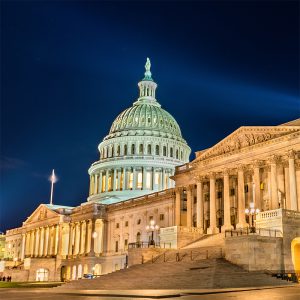Tax season may be over, but the tax system’s impact on American society is year-round. This is perhaps most evident in the continuing debate around the debt ceiling, and, obviously, tax revenues play a factor in the governmental shortfall. A recent report from the Penn Wharton Budget Model found that April’s tax revenues were lower than expected (to the tune of roughly $150 billion), shortening the lead time for the U.S. to raise the debt ceiling.
Jeff Hoopes, UNC Kenan-Flagler Business School associate professor and research director of the Kenan Institute-affiliated UNC Tax Center, researches issues at the intersection of accounting and public economics. To discuss the taxation and fiscal implications in greater detail, we asked him several questions around how the debt ceiling crisis interacts with tax and fiscal policy.
Since the pandemic began, tax collection spiked in 2021 and particularly 2022, before falling dramatically in 2023. How do these dynamics play into the current debt ceiling situation?
We did see some spikes in tax revenue at the national level and at the state level. But, we saw even larger spikes in spending. At the height of the pandemic, and even after, Congress sent a LOT of money out the door trying to stave off a pandemic-fueled recession or depression. For the most part, the spending accomplished that goal, but also had other side effects, the most obvious of which was increasing the debt by large amounts, pushing us closer to the debt limit (another was inflation). So, we certainly would have approached the limit slightly more slowly without that bump in revenue. But, at the rate we were (and are!) spending, we would have got there anyway.
What implications do you think the current debt ceiling crisis will have for government spending and tax policy, if any?
In the long term, and likely to some extent in the short term, we will simply have to spend less and raise more. How we spend less and how we raise more are, of course, hugely charged political questions that we will need to sort out (soon!), but this current debt ceiling debate is simply our occasional check-in regarding our spending and tax problems where we are reminded of the two different policy agendas the two parties have chosen to espouse.
How do you see the debt ceiling deadline (and any resultant fiscal changes) playing into consumers’ and firms’ tax policy expectations?
I don’t see the specific deadline as having any implications for consumers’ and firms’ tax policy expectations in the short term around the deadline, other than perhaps rationally expecting higher taxes or less spending. In the long term, things will need to change. Of course, it has been a long time that “in the long term” things have needed to change, so it’s hard to know what will happen even in the long term, and how people will form expectations about those changes.
The White House has proposed a list of tax loopholes to close as a method of reducing the deficit. Are there any tax loopholes that you think would be beneficial to address? More broadly, are there other specific tax policy recommendations you would make?
I have a podcast called “Tax Chats,” and we recently had as a guest Brian Riedl, a senior fellow at the Manhattan Institute. The theme of the show is a point that Brian is frequently making, and it is that long term, we have a very large difference between spending and taxes. Changing a few of the tax laws that President Biden calls loopholes (most of which are intentionally enacted tax laws Congress created, not “loopholes” at all) won’t make a big difference. No serious politician is suggesting the types of tax changes needed to close the deficit sufficiently to stave off deficit related problems. With no spending changes, in the long term, it will take massive changes in the tax code to close the deficit. Things like increasing everyone’s tax rate (not just rich people’s—there are just not enough rich people to solve the problem), or implementing a value-added tax or carbon tax, eliminating the step-up in basis at death, increasing the capital gains tax rate, etc.—the kinds of things that no politician would dare talk about. Of course, this taxing need lessens if we help solve the problem by also spending less.
Politicians get elected by promising to fund the government by stopping waste, fraud and abuse, and by taxing the rich. This works to get elected because no one thinks of themselves as a wasteful, fraudulent, abusive, rich person, so they think someone else will be paying those taxes. But, in the end, those types of promises will never be able to pay the bills. In reality, we must find a way to make those bills smaller by cutting some spending, and we must increase revenue somehow. In the long term, it will likely need to be in ways that affect everyone.
What are the obstacles to the U.S. being able to generate necessary levels of tax revenue in the near future? Would it be possible for the U.S. to generate higher levels of tax revenue and stave off future debt ceiling crises?
Everyone thinks someone else should pay more in taxes, leaving no one to actually pay them. We have one party that has many of its members pledging not to increase taxes at all (as I talked about on my podcast with the creator of the pledge), and another that has promised to not increase taxes for almost every individual person (everyone making less than $400,000, which is the vast majority of people). With those two promises, there are simply not a lot of options left.
People just don’t like being taxed (with few exceptions!). There is simply no current political appetite to seriously increase taxes for the spending commitments we have already made, and I think that will only change as we start to see larger economic problems associated with a growing deficit, debt, and interest payments.
- Keyword(s):
- federal tax 34
- finance 266
- tax 31


In Over Our Head: The Debt Ceiling and Taxes